Uvi Poznansky's Blog, page 113
May 3, 2017
His First Home
Here is the place—he can bring it back—his first home. Straight ahead is the door with a big handle high above. He can easily reach it, standing on the tips of his toes and pushing, pushing forward. It opens! Here is the room, which he shares with his sister, Batia. He is three yours old; she is five. And somehow he knows: she will come in later, much later. He can climb into bed now. Sleep is coming; he can feel it. Sleep is almost here. It weighs heavily on his lids, but—for just a second—he can lift his dreamy gaze and look up at the painted ceiling. Half of it is night, with a large crescent moon surrounded by a swirl of stars, the other half—day, with a bright, yellow sun. He rubs his eyes, astonished. Nothing like this has ever happened before: They stir! The sun, the moon and the glowing stars—they all seem to move, seem to turn overhead... Then, all of the sudden, amidst the glow, he finds himself standing at the banks of a lake with his daddy. He lets go of his daddy’s hand, flings a stone and at once he can spot—right there, in the middle of the lake—a ripple taking shape. One circle rises magically inside another, widening, riding out farther and farther until at long last it fades out. White lilies can be seen floating all around. One of them is right here, at arms reach. Only a thin line, the line of illusion, separates the petal from its white reflection. And underneath it, schools of golden fish scurry in one direction, then take a sharp turn and flow elsewhere. And from somewhere in the distance he can hear a shrill sound: the whistle of a train. Soon, Zeev knows, it will go out of earshot again, as the train travels past the hills, going away on its mysterious journey, calling him to come, calling him to follow.
Excerpt from Home
In writing this passage I was inspired by my father's recollections of his childhood home. He told me that the ceiling was painted by his mother as half day and half night sky. He remembered it vividly, till his last day.
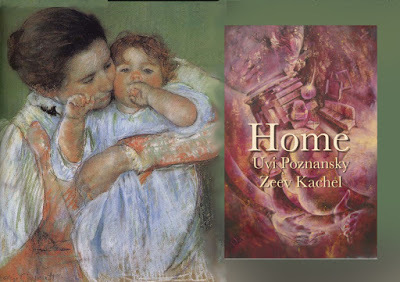
★ Inspired by poetry? Get this book ★Home
FREE Ebook: Kindle ★ Nook ★ Apple ★ Kobo ★ Smashwords Audiobook: Amazon ★ Audible Paperback: Amazon ★ Barnes&Noble

Published on May 03, 2017 18:59
May 2, 2017
I will never let that happen to me
His head is now barely visible; eyes and nose already submerged, he seems to struggle for air. Mud is flowing into his white mouth, and at the surface, froth starts regurgitating. “Fallen angels are a dime a dozen around here,” grumbles a throaty voice from above. Her foot kicks some more muck in his direction. “Some,” she says, “have no names at all.”Startled I look up, and by her diamond-studded high heel sandals I recognize her.“This one,” I point. “What’s his name?”Leila hisses at me, “Who cares.”“Doesn’t he have one?”“Don’t you?” Which gives me pause. My name is at the tip of my tongue and yet, I cannot utter it. Sigh. Somehow it has been erased from memory. “Unlike you,” I retort, if only to hide my frustration, “I used to have one.”“And a big fuss you made over it last night,” she shoots back.“And just how—I mean, how would you hear about that?”“I was there, darling. Stood so close behind you, I could practically poke you,” says Leila. “Didn’t you feel my presence? I couldn’t help blowing my breath at your neck, just to see you shudder... Lordy Lord, Lord of the flies! You made such a goddam stir over nothing.”And before I can catch my breath to answer, on she goes, “A poor woman such as yourself should know her place, and never argue with her man, let alone with the elders in the village! Your name is not worth all that disrespect, dear. I expected that in a second, lightning would come down to strike you down. I knew, I just knew what was coming.”“Did you,” I say. “Indeed,” she says, with a hard glint in her eyes. “There I was, sniffing at your back, itching, itching, itching to take hold of you already...”I gulp, so she goes on to say, “Unfortunately, the down elevator was broken; stuck down here in the pit. So alas, I had to bide my time.”The bitch kicks at the fallen angel again—but his time, her big toe is snagged, perhaps by a rock. “Damn, damn, damn it,” says Leila. “And damn you! You and your stupid name and your stupid quibbles and fights with everyone around you.”“My name,” I insist, “is all I have left.”“Not anymore,” she corrects me. “It has, by now, been stripped away from you. Looking at your eyes, I can tell.”“Even so! It’s still mine,” I say, noting a tone of stubbornness in my voice. “Oh, dream on,” she shrugs. “And not that I care, but did you have to argue with the elders over it? Have you no civility, woman? No respect for them, or for keeping the silence in the village library?”“Who gives a damn,” I say. “Who cares about those three wrinkly prunes, decking themselves with thick furs, shuffling their fancy quills between their porcelain-white fingers as if they, and no one else but them, were the instruments of God?”To that she can find no answer, and so I press on, “All the while there I stood, right in front of their long table, trying not to fold over with the pangs of hunger, spotting the bread crumbs on the floor, and bracing myself with nothing but my pride so I don’t bend down before them.”Leila passes her gaze over me top to bottom. Then with a belittling smile she says, “You had nothing on but stained tatters, dear. Not your best attire, you must admit. Making an appearance in rags like that cannot possibly make a good impression on anyone, let along on those wise guys.”“Fashion is a crucial thing, normally,” I agree. “But in this case, let me ask you: who on earth gave them the idea that they are in charge of us village folk?”And she says, “They are the keepers of history, woman. You ingrate! You should kiss their feet for putting your ancestry in writing.” “Not mine, they don’t,” I say vehemently. “Oh sure, men’s ancestry is carefully kept. Our land, the land of Uz is named after Uz, son of Aram, son of Shem, son of Adam. But then—women? In my village they are of less value than cattle. So you tell me: is there any purpose for keeping the ancestry of cattle?” She scratches her head, and comes up with, “None other than breeding, I suppose—” “Exactly! Breeding, that’s what women are good for, in a man’s world. So their ancestry is forgotten, their names erased, their lives become mere anecdotes. In time, they become invisible holes in the fabric of the story. It’s as if they never existed.”And I hope that somewhere, in her heart of hearts she feels for me when I say, “Look: when I was a little girl I ran up a hill from my house; and across the valley I spotted a pillar of salt. I couldn’t resist coming closer. I stood at her feet, looked up and met the eyes, the empty eyes of Lot’s Wife. And right there and then, seeing the trail of bitter tears running down her neck, I promised myself: I will never let that happen to me!”
Excerpt from Twisted
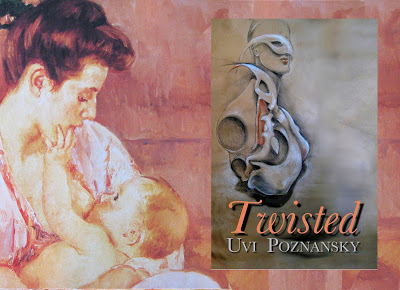
★ Love reading? Get this book ★Twisted FREE: Ebook: Kindle ★ Nook ★ Apple ★ Kobo ★ Smashwords Paperback: Amazon ★ Barnes&Noble Audiobook: iTunes ★ Audible ★ Amazon
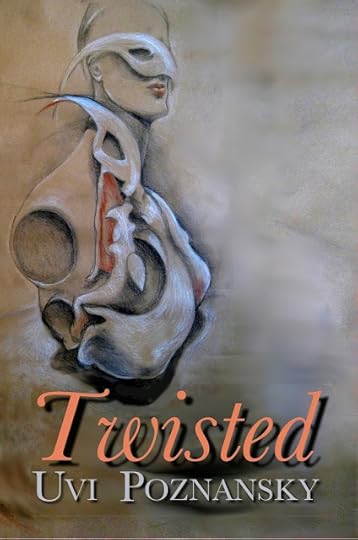
The ideas seem from a different realm of non-reality, but they are so immaculately constructed that each work becomes a little treasure to visit repeatedly.
-Grady Harp, Hall of Fame Reviewer
Excerpt from Twisted

★ Love reading? Get this book ★Twisted FREE: Ebook: Kindle ★ Nook ★ Apple ★ Kobo ★ Smashwords Paperback: Amazon ★ Barnes&Noble Audiobook: iTunes ★ Audible ★ Amazon

The ideas seem from a different realm of non-reality, but they are so immaculately constructed that each work becomes a little treasure to visit repeatedly.
-Grady Harp, Hall of Fame Reviewer
Published on May 02, 2017 13:54
Curious about how to breathe life into a story?
 I am thrilled to have the talented narrator of my historical fiction book, The Edge of Revolt, here with me for an interview. If--like me--you are curious about the craft of breathing life into stories, come join us to hear what Bob Sterry has to say about his craft. And be sure to take a listen to one of his touching poems at the end of the interview.
I am thrilled to have the talented narrator of my historical fiction book, The Edge of Revolt, here with me for an interview. If--like me--you are curious about the craft of breathing life into stories, come join us to hear what Bob Sterry has to say about his craft. And be sure to take a listen to one of his touching poems at the end of the interview.Interview with Bob SterryNarrator
Uvi: Just from reading your online profiles I am curious to know how you found your way to narrating books. Your background is intensely technical and your career in sales reflected that.
Bob: I think I am fortunate and unfortunate, blessed and cursed, to be one of those people whose left and right brains are so much closer or equal than usual. As a child, I was fascinated by how things worked. I took things to pieces all the time. I drew bicycle frames and accessories. I tried to read my Father’s engineering notes, his text books and magazines. I scoured the local dump for radio parts. At ten I had a complete set of drawing instruments; a compass, set square and parallel ruler. I could read at an early age. At the same time as I was attempting technical drawings I was reading my Fathers book club issues before he got to them. I was at home when the postman delivered them! For my tenth birthday, an Aunt gave me my first book token (does anyone know what that is anymore?). I took a bus into town, bought a book, and had read more than half of it on the ride home. I still have that book, The Wind in the Willows.
Uvi: So, did your education point you towards literature?
Bob: Not at all. When I was eleven I went to my secondary school which was twelve miles away. From the age of fifteen onwards I studied nothing but science and mathematics. To get to school I took two connecting public bus journeys. It took about an hour and a quarter. But on those bus rides, when I should have been reading my notes on Organo-Phosphorus compounds, and when I was not fighting with other kids, I read, Huxley, Orwell, Waugh, D.H. Lawrence, Camus, De Maupassant, Gide, Sartre, Moravia, Wodehouse, Greene, Amis, even Baudelaire! and any science fiction I could find. My ten shilling pocket money went on books. My interior world, my universe was the expanse of literature. I don’t think there has been a day when I am not reading something. In the house, on a plane, at the dentists, the doctors, in bed, you name any place where one waits.
Uvi: And did things change for you at college?
Bob: Again, no…I went to a College of Technology and studied nothing but chemistry for four years, and got a job in chemical research. I became the world’s worst chemist. It was not that I did not like science. I loved it, but not very good at the theory! Whatever slight knowledge I had managed to absorb did actually help me get a technical career in America, for which I am profoundly grateful. I am a proud immigrant.
But narrating? As my technical career wound down I started working with my partner, wife, Anne-Louise. She is a true polymath. A Pysch nurse, a musician, a speaker, a singer-song writer and trainer. I started singing myself, I started performing, I did a few plays, some musicals. I started writing, short essays, poetry, finding my voice. And those who heard my voice liked it. At first I thought I should try getting work as a Voice Over actor. Not easy. The market is full of actors, ‘between roles’, whose agents are only too glad to get them work with advertising agencies. And the agencies really don’t seem to want to explore new voices. If I had to choose between Bob Sterry and Morgan Freeman for an insurance promotion I think I know who I would choose! I have done a few pieces for local companies which took me nowhere. It was then that my love of books and poetry combined with book narration began to make sense.
Uvi: What were your first recordings?
Bob: Ha! Me singing with Anne-Louise in one of her shows, and then I had a videographer record one of my cabaret shows. But for genuine narration it was me recording my own poetry, editing with some images so I could post them on YOUTUBE.
Uvi: What do you enjoy most about narrating?
Bob: That is not a straightforward question to answer. There is no single feature of the work that stands clear, but perhaps a combination of several. The interest in reading a work that I would probably have never chosen for myself; the knowledge that someone somewhere in the world is listening to my voice and it is adding to their enjoyment of the book; the pleasure, actually a challenge, of finding ways to express an emotion in what at first seems a simple phrase, actually adding to the whole artistry of the work; and of course, the idea that I will get paid for my work!
Uvi: And I have to ask, what do you enjoy least about narrating?
Bob: Editing! It is a rare studio session when everything goes right, and the track is pristine and ready to go. There is inevitably some editing to be done before the track is clean. Add to this that it is an essential part of the business that authors get to request changes in pronunciation and delivery, after all, it is their book. It is necessary, time consuming, but not a lot of fun, even with modern recording software! Not to mention that my studio, although fairly well soundproofed is not able to filter out the sounds of my neighbor’s chain saw and chipper! So, waiting for a ‘sound break’ in the ‘noise cloud’ of the neighborhood can be tiresome. I am often in the studio late at night and into the morning hours. It can be frustrating when one is trying to meet a deadline to be held up by local forestry operations….
Uvi: Do you listen to audio-books yourself?
Bob: Ah...well, no. I am embarrassed to admit I am one of those readers who believe I can populate the virtual theater of my imagination without prompting. And of course, it could be like asking violinist Joshua Bell to compare his performance with that of Gil Shaham, Itzhak Perlman, or Simone Lamsma! But truthfully, I have not really explored the idea of listening to books myself to thoroughly. There are probably voices that I could listen too without thinking, you know, that pause was too long, or she should have put in a little sob just there.
Uvi: And what do you hope for the future in your work?
Bob: I think every narrator hopes that their voice will be ‘discovered’ by, say, A.J. Rowling, Stephen King, or another best-selling author. But for the moment I am happy to have been ‘discovered’ by best-selling author Uvi Posnansky. Looking forward I would like work on not only narrating audio books but documentary narration. It would be a new challenge and I think all artists need that.
Uvi: Any last thoughts, Bob?
Bob: Apart from you should read all of Uvi Posnanzky’s books, subscribe to her blog and listen to the audio book editions? Buy books, keep reading, encourage writers and hug your children.
Our Helium Warrior ReturnsDec 21 at 8.49 PM is this years (2015) winter solstice. This is a short prose poem, written and read by Bob Sterry a few years ago to express how we deal with it in the Pacific NW.
More about our work in the coming weeks... Stay tuned! Meanwhile, check out Bob's links:Website BlogLinkedIn
Published on May 02, 2017 02:03
May 1, 2017
Rich insight into David and Bathsheba!
Jan Romes is the author of witty contemporary romance books, and a part-time fitness trainer. She also enjoys growing pumpkins and sunflowers. I am thrilled to find her review of my art book, Inspired by Art: A Peek at Bathsheba:
5.0 out of 5 stars Rich insight into David and Bathsheba!ByJan Romeson April 30, 2017Format: Kindle Edition|Verified Purchase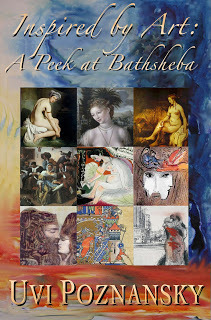 This review is from: Inspired by Art: A Peek at Bathsheba (The David Chronicles Book 7) (Kindle Edition)I love the classic depictions of David and Bathsheba portrayed by the various artists, but I was equally intrigued by the modern canvasses of the famous couple. The paintings and captions beneath them in this book are a brilliant prelude to the stories in The David Chronicles series by Ms. Poznansky. For me, this book was a rich insight into what awaits me in the series.
This review is from: Inspired by Art: A Peek at Bathsheba (The David Chronicles Book 7) (Kindle Edition)I love the classic depictions of David and Bathsheba portrayed by the various artists, but I was equally intrigued by the modern canvasses of the famous couple. The paintings and captions beneath them in this book are a brilliant prelude to the stories in The David Chronicles series by Ms. Poznansky. For me, this book was a rich insight into what awaits me in the series.
5.0 out of 5 stars Rich insight into David and Bathsheba!ByJan Romeson April 30, 2017Format: Kindle Edition|Verified Purchase
 This review is from: Inspired by Art: A Peek at Bathsheba (The David Chronicles Book 7) (Kindle Edition)I love the classic depictions of David and Bathsheba portrayed by the various artists, but I was equally intrigued by the modern canvasses of the famous couple. The paintings and captions beneath them in this book are a brilliant prelude to the stories in The David Chronicles series by Ms. Poznansky. For me, this book was a rich insight into what awaits me in the series.
This review is from: Inspired by Art: A Peek at Bathsheba (The David Chronicles Book 7) (Kindle Edition)I love the classic depictions of David and Bathsheba portrayed by the various artists, but I was equally intrigued by the modern canvasses of the famous couple. The paintings and captions beneath them in this book are a brilliant prelude to the stories in The David Chronicles series by Ms. Poznansky. For me, this book was a rich insight into what awaits me in the series.
Published on May 01, 2017 15:18
April 30, 2017
Once in Royal David’s City
In the last few weeks I have been collaborating with my gifted narrator, Bob Sterry, on the upcoming audiobook edition of my historical fiction novel, The Edge of Revolt. By collaborating I mean, he's breathing life into it, while I'm doing the easy part: listening. By now Bob is on a roll, so the work is drawing to its end faster than I expected. Before the curtain falls, before I'm left alone in the darkened theatre, I asked him to share his thoughts about this project and about his craft, so I can share them with you.
Like David in my story, who is a complex, rich character, Bob has a highly analytic mind, which I can hear in the ways he interprets my writing, yet he writes poetry. As a poet, he understands the value of something that some readers may take for granted: pauses at the end of paragraphs and even at the end of sentences. They provide the space in which the words resonate, which allows them to linger in your ear, your mind.
Listening to him, I visualize the text in a geometrical way: as vectors connecting nodes (words) that float in different places in space, each node overloaded with meanings. Some of us flatten this space when we read aloud, so each sentence become linear. Not so Bob. With his voice, the story lives on, traveling through a bright, vibrant space.
I invite you now to read his article:
Once in Royal David’s City
Or: The One-Man Theaterby
Bob Sterry
“Once in Royal David’s city, stood a lowly cattle shed” are the opening lines of a well known Anglican Christmas carol. One which I knew by heart by the time was eight or nine. I had little idea who this David was. My youngest brother, David, had just been born, and I knew the song was not about him. This other David, apart from having a royal city was chiefly famous for having killed (slain, actually) a very large man with an exceedingly lucky hit from a slingshot. Amongst my urban savage friends there was a lively discussion of how he could have pulled this off. We doubted it could be done. We thought slingshots a very inaccurate and slow loading weapon. We all had our own hand made catapults, and argued that if this David had had any sense he would have had one and used it. Later on in our English Anglican education we learned that Jesus was distantly related to this giant killer, and this was supposed to be a good thing. We could not figure out why this was so and our teachers were superbly vague on the subject. Knowing what ultimately happened to Jesus we young cynics became ever more doubtful that being related to improperly armed minor royalty of any age could possibly be a good thing.
Fast forward many decades to a less cynical but very analytical man sitting in a recording booth narrating a book about King David into a microphone. The Edge of Revolt by Uvi Poznanksy. One of a series of historical novels by her about this leader of Israel. Late in life I am learning a lot about King David and the history of an ancient land. I am also getting a geography lesson. The history and geography lessons are one of the pleasant parts of recording a book for Audible or any other audiobook service. The less easy challenges in this task are several if not multiple.
Imagine that you are reading the same book I am recording. As you read you will automatically construct an ambiance, an atmosphere of the locations in the book. You will create voices for each of the characters. Readers have no difficulty in returning to a book at any time and recreating these characters and feelings. For an audiobook narrator, he too must create that ambiance, those characters, in his mind, and then deliver them to you using only his voice. He has also to be utterly consistent in his delivery. He has to create a distinctive voice for each of the characters. He has to try and understand the authors intention as well or even better than they did when writing the book so as to be able to communicate every nuance of feeling, every subtle hint, every change of emotion the text contains, and then perhaps add some not foreseen or anticipated by the author. He is in fact a one-man theater. Playing all the characters, changing the scenery, the lighting, the mood, the pace, to an invisible and utterly silent audience. He is the theater. A virtual theater.
But narrator beware! Strongly emoting, acting, is not always appreciated by listeners. Many remain interested in populating the drama, the story, the scene, with their own interior voices and emotions. They are not always interested in your interpretation of the text, only needing the reading of the text as a prompt for their own imaginations. They don’t want much theatricality. It is a fine balance and the narrator needs to listen to the author and use his own experience before turning the microphone on.
What this means is that the selection of a narrator by an author has to be a carefully considered process. Morgan Freeman and Ben Kingsley, as talented as they are, are not suited for every book. Not to mention their cost! I myself have to think very carefully about what books I can genuinely and honestly produce and achieve that balance. However, this does not prevent me from accepting challenges that stretch my own perception of my strengths and skills. Authors may hear something in a narrators voice and style they themselves did not know or even suspect they possessed, and want it for their book.
In recording Uvi Poznansky’s book The Edge of Revolt about the midlife and final moments of King David, I avoided none of these challenges, and faced a few additions. Uvi found my voice on the Amazon managed site, Audible Creative Exchange. Narrators can create a profile, including samples of their voice, and authors can post a summary of their book and the narrator they are looking for. It’s a literary dating site!
Male narrators are often called to produce recordings with both male and female voices. In ‘The Edge of Revolt’ there are more than a few female voices and they are of differing ages and temperament. For some of these voices I dip into my family history and find the voices of my aunts, with their London accents. And for others the comic genius of Monty Pythons Flying Circus is a rich source. The same was useful for the variety of male characters; my relatives, theatre and broadcast personalities. And in doing so I find a special challenge. If a narrator uses an immediately recognizable character voice he may run the risk of distracting the listener from the flow of the story. It has to be done with care. Using the voice of Richard Nixon for King David, whilst amusing, is just not going to work.
I had to find at least three voices for King David. The first is that of a proud and confident man. A man enjoying his power and status. The next is of the same man but humbled and frustrated by the unfolding of events he himself has caused. A man at the mercy of the complications of reconciling paternal love, succession, and national unity. And another is of the man breathily composing or reciting poetry and psalms he regards as his legacy. Finally, I have to make him into an older, tired man, waiting on death.
And of course, the names of all the characters in the book are pronounced not as I grew up thinking they should be! And there are Hebrew names I have never seen or heard before. This is when I am grateful for the patience and attention to detail that Uvi Poznansky shows. I can rely on her to send me guidance and corrections very quickly. This is important. It makes editing so much simpler when the context is still fresh in the mind, echoing. Editing sound tracks with edits sent much later one can easily lose the continuity of expression and pace needed for a good recording. For every hour of recording there is usually at least thirty minutes of editing to be done, and keeping it from encroaching on recording time is always on my mind.
And as I wrote earlier the balance to be found between over and under emoting was always present in recording this work. Again, I found Uvi Poznansky to be the kind of author a narrator needs, providing enough guidance to correct mistakes but not so much as to prevent creativity on my part.
And now I must go and practice my seductive Bathsheba voice. All in a day’s work for a narrator of audiobooks...
April 30, 2017

More about our work in the coming weeks... Stay tuned! Meanwhile, check out Bob's links:
Website BlogLinkedIn
Like David in my story, who is a complex, rich character, Bob has a highly analytic mind, which I can hear in the ways he interprets my writing, yet he writes poetry. As a poet, he understands the value of something that some readers may take for granted: pauses at the end of paragraphs and even at the end of sentences. They provide the space in which the words resonate, which allows them to linger in your ear, your mind.
Listening to him, I visualize the text in a geometrical way: as vectors connecting nodes (words) that float in different places in space, each node overloaded with meanings. Some of us flatten this space when we read aloud, so each sentence become linear. Not so Bob. With his voice, the story lives on, traveling through a bright, vibrant space.
I invite you now to read his article:
Once in Royal David’s City
Or: The One-Man Theaterby
Bob Sterry
“Once in Royal David’s city, stood a lowly cattle shed” are the opening lines of a well known Anglican Christmas carol. One which I knew by heart by the time was eight or nine. I had little idea who this David was. My youngest brother, David, had just been born, and I knew the song was not about him. This other David, apart from having a royal city was chiefly famous for having killed (slain, actually) a very large man with an exceedingly lucky hit from a slingshot. Amongst my urban savage friends there was a lively discussion of how he could have pulled this off. We doubted it could be done. We thought slingshots a very inaccurate and slow loading weapon. We all had our own hand made catapults, and argued that if this David had had any sense he would have had one and used it. Later on in our English Anglican education we learned that Jesus was distantly related to this giant killer, and this was supposed to be a good thing. We could not figure out why this was so and our teachers were superbly vague on the subject. Knowing what ultimately happened to Jesus we young cynics became ever more doubtful that being related to improperly armed minor royalty of any age could possibly be a good thing.
Fast forward many decades to a less cynical but very analytical man sitting in a recording booth narrating a book about King David into a microphone. The Edge of Revolt by Uvi Poznanksy. One of a series of historical novels by her about this leader of Israel. Late in life I am learning a lot about King David and the history of an ancient land. I am also getting a geography lesson. The history and geography lessons are one of the pleasant parts of recording a book for Audible or any other audiobook service. The less easy challenges in this task are several if not multiple.
Imagine that you are reading the same book I am recording. As you read you will automatically construct an ambiance, an atmosphere of the locations in the book. You will create voices for each of the characters. Readers have no difficulty in returning to a book at any time and recreating these characters and feelings. For an audiobook narrator, he too must create that ambiance, those characters, in his mind, and then deliver them to you using only his voice. He has also to be utterly consistent in his delivery. He has to create a distinctive voice for each of the characters. He has to try and understand the authors intention as well or even better than they did when writing the book so as to be able to communicate every nuance of feeling, every subtle hint, every change of emotion the text contains, and then perhaps add some not foreseen or anticipated by the author. He is in fact a one-man theater. Playing all the characters, changing the scenery, the lighting, the mood, the pace, to an invisible and utterly silent audience. He is the theater. A virtual theater.
But narrator beware! Strongly emoting, acting, is not always appreciated by listeners. Many remain interested in populating the drama, the story, the scene, with their own interior voices and emotions. They are not always interested in your interpretation of the text, only needing the reading of the text as a prompt for their own imaginations. They don’t want much theatricality. It is a fine balance and the narrator needs to listen to the author and use his own experience before turning the microphone on.
What this means is that the selection of a narrator by an author has to be a carefully considered process. Morgan Freeman and Ben Kingsley, as talented as they are, are not suited for every book. Not to mention their cost! I myself have to think very carefully about what books I can genuinely and honestly produce and achieve that balance. However, this does not prevent me from accepting challenges that stretch my own perception of my strengths and skills. Authors may hear something in a narrators voice and style they themselves did not know or even suspect they possessed, and want it for their book.
In recording Uvi Poznansky’s book The Edge of Revolt about the midlife and final moments of King David, I avoided none of these challenges, and faced a few additions. Uvi found my voice on the Amazon managed site, Audible Creative Exchange. Narrators can create a profile, including samples of their voice, and authors can post a summary of their book and the narrator they are looking for. It’s a literary dating site!
Male narrators are often called to produce recordings with both male and female voices. In ‘The Edge of Revolt’ there are more than a few female voices and they are of differing ages and temperament. For some of these voices I dip into my family history and find the voices of my aunts, with their London accents. And for others the comic genius of Monty Pythons Flying Circus is a rich source. The same was useful for the variety of male characters; my relatives, theatre and broadcast personalities. And in doing so I find a special challenge. If a narrator uses an immediately recognizable character voice he may run the risk of distracting the listener from the flow of the story. It has to be done with care. Using the voice of Richard Nixon for King David, whilst amusing, is just not going to work.
I had to find at least three voices for King David. The first is that of a proud and confident man. A man enjoying his power and status. The next is of the same man but humbled and frustrated by the unfolding of events he himself has caused. A man at the mercy of the complications of reconciling paternal love, succession, and national unity. And another is of the man breathily composing or reciting poetry and psalms he regards as his legacy. Finally, I have to make him into an older, tired man, waiting on death.
And of course, the names of all the characters in the book are pronounced not as I grew up thinking they should be! And there are Hebrew names I have never seen or heard before. This is when I am grateful for the patience and attention to detail that Uvi Poznansky shows. I can rely on her to send me guidance and corrections very quickly. This is important. It makes editing so much simpler when the context is still fresh in the mind, echoing. Editing sound tracks with edits sent much later one can easily lose the continuity of expression and pace needed for a good recording. For every hour of recording there is usually at least thirty minutes of editing to be done, and keeping it from encroaching on recording time is always on my mind.
And as I wrote earlier the balance to be found between over and under emoting was always present in recording this work. Again, I found Uvi Poznansky to be the kind of author a narrator needs, providing enough guidance to correct mistakes but not so much as to prevent creativity on my part.
And now I must go and practice my seductive Bathsheba voice. All in a day’s work for a narrator of audiobooks...
April 30, 2017

More about our work in the coming weeks... Stay tuned! Meanwhile, check out Bob's links:
Website BlogLinkedIn
Published on April 30, 2017 17:08
April 28, 2017
Fun and Fast interview and giveaway with Uvi Poznansky
I am honored to be interviewed on Tabitha Barret's website, where I also offer a giveaway prize. She was curious to know Why should readers buy my book? To which I said:
Regardless of genre, books can do one of two things: they can let you escape from reality, or they can set a mirror before you where you can see it, even in its darkest corners, with brilliance and precision you have not faced before. My books do both. Set in a different era, for example WWII London, they sweep you away into remembering every detail of that time, from how women styled their hair to how a telephone call from a booth was connected overseas. But arching over all these details is the way you will engage with my characters, and follow them in the hard choices they must make. Their joys and sorrows may reflect what you have gone through in your past. If you want to see what’s in your heart, read my stories.
Want to read more, and learn about the giveaway? Click here:
Fun and Fast interview and giveaway with Uvi Poznansky
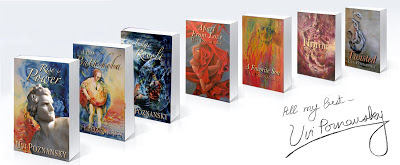
Regardless of genre, books can do one of two things: they can let you escape from reality, or they can set a mirror before you where you can see it, even in its darkest corners, with brilliance and precision you have not faced before. My books do both. Set in a different era, for example WWII London, they sweep you away into remembering every detail of that time, from how women styled their hair to how a telephone call from a booth was connected overseas. But arching over all these details is the way you will engage with my characters, and follow them in the hard choices they must make. Their joys and sorrows may reflect what you have gone through in your past. If you want to see what’s in your heart, read my stories.
Want to read more, and learn about the giveaway? Click here:
Fun and Fast interview and giveaway with Uvi Poznansky

Published on April 28, 2017 09:22
April 27, 2017
Further insights into the life of King David through artists’ eyes
Author of War Songs, Grady Harp is an artist representative, gallery owner, writer of essays and articles on figurative and all Representational art for museum catalogues and for travelling exhibitions, and an Amazon Hall of Fame Reviewer. He describes himself as being ever on the alert for the new and promising geniuses of tomorrow. So I am deeply honored that he has posted this five-star review for my art book, Inspired by Art: The Last Concubine:
5.0 out of 5 stars Further insights into the life of King David through artists’ eyesByGrady HarpHALL OF FAMETOP 100 REVIEWERVINE VOICEon April 27, 2017Format: Kindle Edition|Verified Purchase
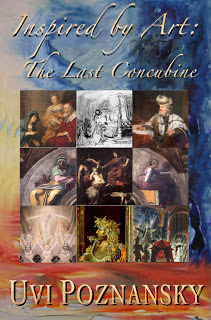 Uvi Poznansky dons another Technicolor coat in this latest series of books, always raising the bar for her high standard previous achievements. Originally from Israel where she studied Architecture and Town Planning then moving to the US where she studied Computer Science and became an expert in Software Engineering, Poznansky managed to combine the design elements of two studies into unique formats. And she has accomplished the same with the other side of her brain - making visual her ideas (she is an accomplished painter, drawer, and sculptor who has enjoyed exhibitions both in Israel and in California, her present base) and making words in poetry and in short stories and children's books.
Uvi Poznansky dons another Technicolor coat in this latest series of books, always raising the bar for her high standard previous achievements. Originally from Israel where she studied Architecture and Town Planning then moving to the US where she studied Computer Science and became an expert in Software Engineering, Poznansky managed to combine the design elements of two studies into unique formats. And she has accomplished the same with the other side of her brain - making visual her ideas (she is an accomplished painter, drawer, and sculptor who has enjoyed exhibitions both in Israel and in California, her present base) and making words in poetry and in short stories and children's books.
Uvi’s 9th volume in her inspired by art The David Chronicles is titled THE LAST CONCUBINE. For those less familiar with the story of David this book about Abishag some recapping of her part with David may help: Abishag was a young woman of Shunem, distinguished for her beauty. She was chosen to be a helper and servant to David in his old age. Among Abishag's duties was to lie next to David and keep him warm; however, David did not have sexual relations with her. The Hebrews...believed that the fertility of the soil and the general prosperity of the people were bound up with the fertility of the king. David by this time was old and decrepit and his sexual vigor is called into question. Attempts are made to remedy the situation. The first cure is to heap clothes upon his bed in order to secure such physical heat as might render him capable. When this fails a search is made for the most beautiful woman in the land. Great emphasis is placed upon her Abishag's charms. The fact that the king did not have intercourse with her is decisive in the story. If David was impotent he could no longer be king. After David's death Adonijah (David's fourth and eldest surviving son), persuaded Bathsheba, Solomon's mother, to entreat the king to permit him to marry Abishag. Solomon suspected in this request an aspiration to the throne, and therefore caused Adonijah to be put to death Some scholars point to the possibility that Abishag is the female protagonist in the Song of Songs.
Uvi has published an absorbing book series – The David Chronicles – and now is curating art collections to enhance the pleasure of her books’ stories. This volume is one of the most complete collections of art from ancient through renaissance to contemporary in drawings, paintings, sculptures, etchings – works by Gustave Doré, Schwebel, Pedro Américo, Frederick Goodall, Govert Flinck, Chagall, Nicolaes Antoni Flinck, Ferdinand Bol, Jan Lyken, Michiel vander Borch, Luca Giordano, Valentine de Boulogne, Henri Lindegaar, Michelangelo, Gustave Moreau, James Tissot, Aert de Gelder, Ernst Fuchs, William Blake, Michael Jessing, Salvador Dali, Moshe Tzi Berger, Leonhard, Roberta Weir, Hans Sebald Beham, Edward Hull, William de Morgan, Mandy Sand, engravings, church windows, illustrations unnamed, coins, stamps and more - some well known, others – discoveries.
The art is arranged not by artist but instead by events regarding the life of David. It is a majestic, learned, beautifully designed book that carries a lot of instruction, entertainment, as well as visual pleasure. But then that is what Uvi is all about! Grady Harp, April 17
5.0 out of 5 stars Further insights into the life of King David through artists’ eyesByGrady HarpHALL OF FAMETOP 100 REVIEWERVINE VOICEon April 27, 2017Format: Kindle Edition|Verified Purchase
 Uvi Poznansky dons another Technicolor coat in this latest series of books, always raising the bar for her high standard previous achievements. Originally from Israel where she studied Architecture and Town Planning then moving to the US where she studied Computer Science and became an expert in Software Engineering, Poznansky managed to combine the design elements of two studies into unique formats. And she has accomplished the same with the other side of her brain - making visual her ideas (she is an accomplished painter, drawer, and sculptor who has enjoyed exhibitions both in Israel and in California, her present base) and making words in poetry and in short stories and children's books.
Uvi Poznansky dons another Technicolor coat in this latest series of books, always raising the bar for her high standard previous achievements. Originally from Israel where she studied Architecture and Town Planning then moving to the US where she studied Computer Science and became an expert in Software Engineering, Poznansky managed to combine the design elements of two studies into unique formats. And she has accomplished the same with the other side of her brain - making visual her ideas (she is an accomplished painter, drawer, and sculptor who has enjoyed exhibitions both in Israel and in California, her present base) and making words in poetry and in short stories and children's books.Uvi’s 9th volume in her inspired by art The David Chronicles is titled THE LAST CONCUBINE. For those less familiar with the story of David this book about Abishag some recapping of her part with David may help: Abishag was a young woman of Shunem, distinguished for her beauty. She was chosen to be a helper and servant to David in his old age. Among Abishag's duties was to lie next to David and keep him warm; however, David did not have sexual relations with her. The Hebrews...believed that the fertility of the soil and the general prosperity of the people were bound up with the fertility of the king. David by this time was old and decrepit and his sexual vigor is called into question. Attempts are made to remedy the situation. The first cure is to heap clothes upon his bed in order to secure such physical heat as might render him capable. When this fails a search is made for the most beautiful woman in the land. Great emphasis is placed upon her Abishag's charms. The fact that the king did not have intercourse with her is decisive in the story. If David was impotent he could no longer be king. After David's death Adonijah (David's fourth and eldest surviving son), persuaded Bathsheba, Solomon's mother, to entreat the king to permit him to marry Abishag. Solomon suspected in this request an aspiration to the throne, and therefore caused Adonijah to be put to death Some scholars point to the possibility that Abishag is the female protagonist in the Song of Songs.
Uvi has published an absorbing book series – The David Chronicles – and now is curating art collections to enhance the pleasure of her books’ stories. This volume is one of the most complete collections of art from ancient through renaissance to contemporary in drawings, paintings, sculptures, etchings – works by Gustave Doré, Schwebel, Pedro Américo, Frederick Goodall, Govert Flinck, Chagall, Nicolaes Antoni Flinck, Ferdinand Bol, Jan Lyken, Michiel vander Borch, Luca Giordano, Valentine de Boulogne, Henri Lindegaar, Michelangelo, Gustave Moreau, James Tissot, Aert de Gelder, Ernst Fuchs, William Blake, Michael Jessing, Salvador Dali, Moshe Tzi Berger, Leonhard, Roberta Weir, Hans Sebald Beham, Edward Hull, William de Morgan, Mandy Sand, engravings, church windows, illustrations unnamed, coins, stamps and more - some well known, others – discoveries.
The art is arranged not by artist but instead by events regarding the life of David. It is a majestic, learned, beautifully designed book that carries a lot of instruction, entertainment, as well as visual pleasure. But then that is what Uvi is all about! Grady Harp, April 17
Published on April 27, 2017 14:41
Perhaps there is a touch, a light touch between us
After a brisk walk I turn into 10th street, and the moment I spot the apartment building, the sprinklers in the garden come alive: first with an intermittent stutter, and then with a full-throated singsong; which makes me take a step back, and notice a rainbow hovering, trembling there, in the spray of water. It brings back a moment, an unforgettable moment of that morning, ten years ago, when my mother walked out slowly—with her head held high—as if she was blind to the splash. Now I wonder if mom knew where she was going. What was her goal, her direction? Where, in God’s name, was her there? I remember how her wet dress clung to her body, and how she receded into the distance with her packed suitcase, which seemed to become soggy after a few steps, never once stopping to wipe it, or to turn her head back. Her tears are still here, in the rainbow. I wait for the nozzle to go through its circular motion, and then slip past it, sensing the last of the mist, right here on my skin. At that moment I imagine myself crossing right through her ghost. Perhaps there is a touch, a light touch between us. I feel a breath of air as she fades away and I come in.
Ben in The White Piano
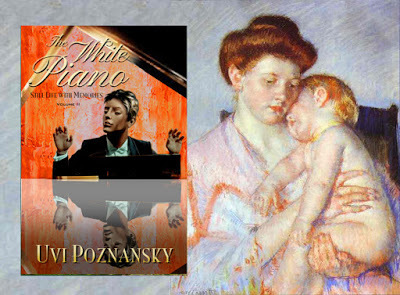
★ Looking for a Mother's Day gift? ★Still Life with Memories
Volume II: The White PianoEbook: Kindle ★ Nook ★ Apple ★ Kobo ★ SmashwordsPaperback: Amazon ★ Barnes&NobleAudiobook: iTunes ★ Amazon ★ Audible
Volume I & II, woven together: Apart from LoveEbook: Kindle ★ Nook ★ Apple ★ Kobo ★ SmashwordsPaperback: Amazon ★ Barnes&NobleAudiobook: iTunes ★ Amazon ★ Audible

Few authors would be able to pull off the manner in which the apparent polar opposites of Ben and Anita begin to bond... but Poznansky has the visual and verbal and architectural skills to create this maze and guide us through it. ~Grady Harp, HALL OF FAME reviewer
Ben in The White Piano

★ Looking for a Mother's Day gift? ★Still Life with Memories
Volume II: The White PianoEbook: Kindle ★ Nook ★ Apple ★ Kobo ★ SmashwordsPaperback: Amazon ★ Barnes&NobleAudiobook: iTunes ★ Amazon ★ Audible
Volume I & II, woven together: Apart from LoveEbook: Kindle ★ Nook ★ Apple ★ Kobo ★ SmashwordsPaperback: Amazon ★ Barnes&NobleAudiobook: iTunes ★ Amazon ★ Audible

Few authors would be able to pull off the manner in which the apparent polar opposites of Ben and Anita begin to bond... but Poznansky has the visual and verbal and architectural skills to create this maze and guide us through it. ~Grady Harp, HALL OF FAME reviewer
Published on April 27, 2017 07:39
April 25, 2017
A Renaissance Lady
My dear friend and gifted author, Sarah Mallery, has just posted a feature on her blog, I am still giggling about her calling me a 'Renaissance Lady'! Check it out:
Uvi Poznansky-A Renaissance Lady
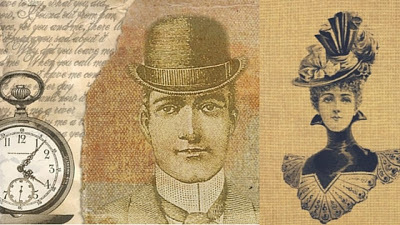
Uvi Poznansky-A Renaissance Lady

Published on April 25, 2017 11:02
April 23, 2017
Because of this I wasn’t able to fall sleep all night
“I’m sure that waking us up makes no difference to you,” she said.To which I said, “Why would you think that, Mrs. Horowitz?”“Because,” she said, “you must think that we here in the Big Apple are up and about around the clock, and besides, we can’t wait to get a call from an important persona such as yourself at any time whatsoever, day or night!”Utterly dumfounded I could not bring myself to say another word, which made it all the more difficult to put together a whole sentence, to beg her to wake up her daughter.So I was just about to say goodbye and so sorry, my mistake, this will never happen again, I promise, when all of a sudden Mrs. Horowitz said, “Natasha isn’t here.”“What?” I cried. “You deaf? I said, she isn’t here!”“Where, then, is she?”“Why should I tell you?”“You’re her Mama! Aren’t you supposed to know?”“It’s all your fault,” she said.To which I said, “Naturally.”She had always been known for being overbearing, but even for her, this relentless attack on me seemed a bit much, which made me realize, suddenly, that this was her way of dealing with something else, something that made her feel powerless.And indeed, a heartbeat later she started crying. “I’m very, very worried about Natasha,” she sniveled. “And because of this I wasn’t able to fall sleep all night!”I hesitated to point out that according to her own words, Mrs. Horowitz had just been rudely arisen from a snooze. Instead I asked, “Did Natasha say where she was going?”“She did,” said her Mama, in a teary voice.“And—”“And you’re not going to believe it. I heard it with my own ears and I still can’t believe it.”“Please,” I pleaded. “Tell me!”“Natasha,” she said, “is a delicate girl.”“She’s a princess.” “Exactly! And until you showed up in her life, she was in a slumber, so to speak. She lived in a world of dreams, smiling at a rainbow, crying for a lost star, and giving herself to nothing else but her music, all of which made it easy for me to manage her career. Well, perhaps ‘easy’ is not the right word, ‘possible’ is. But no, not anymore! Now, unfortunately, my daughter knows what she wants and has an opinion of her own about every little thing, which of course has to be the exact opposite of mine, and the worst thing is, she takes bold action about it, which is quite clearly a mistake, and she does it with half-witted haste, which means that as forceful as I thought I was, I can do little to stand in her way. Oh my, she is out of control!”
Lenny in Dancing with Air

★ Looking for a Mother's Day Gift? Get this series ★Still Life with MemoriesVolume IV: Dancing with Air Ebook: Kindle ★ Nook ★ Apple ★ Kobo ★ SmashwordsPaperback: Amazon ★ Barnes&NobleAudiobook: Amazon US ★ Amazon UK ★ Audible ★ iTunes

"This is a beguiling story of a beautiful love, war intrigues, and Alzheimer’s pain that’s both deep and humorous. You learn new things about fascinating places, long ago time, and challenges that some people must face in life from Uvi’s detailed and well researched work. At the same time, her excellent storytelling skills and well developed characters never fail to entertain."
Ia Uaro, Author
Lenny in Dancing with Air

★ Looking for a Mother's Day Gift? Get this series ★Still Life with MemoriesVolume IV: Dancing with Air Ebook: Kindle ★ Nook ★ Apple ★ Kobo ★ SmashwordsPaperback: Amazon ★ Barnes&NobleAudiobook: Amazon US ★ Amazon UK ★ Audible ★ iTunes

"This is a beguiling story of a beautiful love, war intrigues, and Alzheimer’s pain that’s both deep and humorous. You learn new things about fascinating places, long ago time, and challenges that some people must face in life from Uvi’s detailed and well researched work. At the same time, her excellent storytelling skills and well developed characters never fail to entertain."
Ia Uaro, Author
Published on April 23, 2017 09:03



